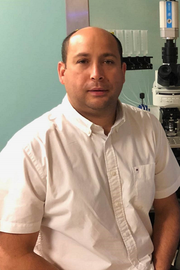
Research in the Cordero/Vásquez group is centered on understanding the structural and molecular basis of ion channels involved in somatosensation and blood pressure regulation. These ion channels are remarkable because they respond to a broad range of physical (e.g., heat and pressure) and chemical (e.g., acid, irritants, and inflammatory mediators) stimuli that depolarize sensory neurons to elicit body perception and increase intracellular calcium concentration in smooth muscle cells to regulate arterial blood pressure.
Dysfunctional sensory receptors are implicated in a broad range of diseases and disorders such as heart arrhythmia, arthritis, sciatica, and chronic pain; thus the group’s studies not only provide fundamental insights into their biophysical properties, but also contribute to the development of new therapeutic agents. The laboratory follows two main avenues:
• in vitro biochemical and biophysical approaches to study the conformational changes of ion channels in response to different physical and chemical stimuli and protein-protein interactions of channel complexes
• in vivo approaches to characterize sensory receptors with novel physiological roles
The group is planning to accomplish these goals by using a multidisciplinary approach that includes molecular biology, behavioral assays, electrophysiology (proteoliposomes, neurons, HEK293/CHO cells, Xenopus oocytes, and in vivo recording), biochemistry (prokaryotic and eukaryotic membrane proteins), X-ray crystallography, electron paramagnetic resonance spectroscopy, and pharmacology of mammalian sensory systems (sensory neuron cultures and calcium imaging). The group’s research will continue to make crucial in-roads into the areas of structural biology, sensory physiology, and mechanisms of drug interaction.
Source: https://www.corderovasquezlab.com/